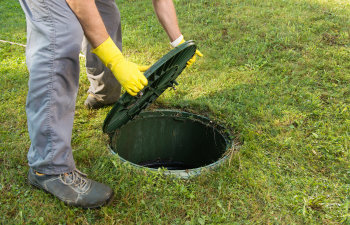
Springtime in Cartersville is beautiful—but for many homeowners, it comes with a thick, yellow dusting of Georgia pollen on every outdoor surface. If you’ve lived in North Georgia long enough, you’re used to wiping down your patio furniture and washing pollen off your car every day during peak season. But have you ever wondered if all that pollen could also impact something you can’t see—like your septic system?
At Metro Septic, we get asked about all kinds of things that can affect septic health, and pollen buildup is no exception. While pollen alone may not clog your septic system, it can contribute to problems over time when combined with other factors. Here’s what you need to know about how excessive pollen can influence your drain field and overall septic system health.
What Is Pollen and Why Is It So Abundant in Georgia?
Pollen is a fine, powdery substance released by trees, grasses, and plants to fertilize other plants. In Georgia, we experience some of the highest pollen counts in the country, especially in the spring. The biggest pollen producers in Cartersville and surrounding areas include:
- Pine trees
- Oak trees
- Bermuda and ryegrass
- Weeds and flowering plants
During peak season, Georgia pollen counts can exceed 3,000 grains per cubic meter, far above what’s considered “high.” That thick yellow coating on your property may seem harmless—but when combined with other elements like rain, debris, and poor yard drainage, it can end up affecting your septic system.
How Excessive Pollen Can Affect Your Drain Field
While pollen itself is a small, organic particle, it doesn’t break down as easily as you might think. Over time, heavy pollen accumulation can indirectly impact your septic drain field and the efficiency of your septic system.
Here’s how:
1. Pollen and Yard Drainage
One of the biggest risks during pollen season is the way pollen interacts with rainwater runoff. When heavy pollen settles on your lawn, driveway, and hard surfaces, it can be swept into your drain field by rain or irrigation. Excessive organic debris and sediment can clog the top layer of soil, limiting how well water percolates down through the drain field.
2. Pollen and Sludge Accumulation
Pollen, when combined with grass clippings, leaves, and other organic debris, can contribute to sludge buildup over your drain field. A layer of organic matter sitting on top of the soil can trap moisture, block evaporation, and stress the soil’s ability to filter wastewater properly.
3. Pollen and Algae Growth
When rain washes pollen into standing water around your drain field, it creates a nutrient-rich environment that can encourage algae and mold growth. This extra biological activity may interfere with your septic field’s ability to absorb and filter wastewater.
4. Increased Organic Load in Your Septic Tank
If pollen enters your septic tank through open areas like clean-out ports, downspouts, or exposed tank lids, it adds to the organic load your system must process. Over time, this can accelerate the need for septic pumping.
How to Protect Your Septic System During Pollen Season
Fortunately, there are several steps you can take to minimize the impact of excessive pollen on your drain field and septic system:
Keep Your Yard Clear
Rake and remove leaves, grass clippings, and debris regularly, especially during pollen season. Pollen particles often stick to other organic material.
Direct Runoff Away from the Drain Field
Make sure your downspouts, gutters, and irrigation systems are not channeling rainwater and pollen runoff toward your drain field.
Mow Smart
When mowing your lawn, use a bagging system if possible to reduce the amount of pollen and debris left on the ground.
Schedule Regular Septic Maintenance
At Metro Septic, we recommend routine septic tank pumping every 3 to 5 years in Cartersville, depending on your household size and system usage. Regular maintenance helps prevent unexpected problems, especially during high organic load seasons like spring.
Inspect Your Septic System After Heavy Rains
Spring showers combined with pollen buildup can cause soil compaction or saturation over your drain field. Watch for signs of drain field stress, including standing water, foul odors, or slow drains.
Consider a Drain Field Evaluation
If you’ve noticed drainage issues or excess water pooling in your backyard during pollen season, a professional drain field inspection may be warranted.
Signs Your Drain Field May Be in Trouble
Excessive pollen buildup isn’t usually the sole cause of drain field failure—but when combined with poor yard maintenance, heavy rain, and overuse of your septic system, it can contribute to problems.
Watch for these warning signs:
- Slow drains and frequent backups
- Gurgling noises in your plumbing
- Soggy, marshy areas around your drain field
- Strong sewage odors outdoors
- Unusually green or lush patches of grass over the drain field
If you notice any of these symptoms, call Metro Septic for a professional evaluation before the problem worsens.
Protect Your Septic System Year-Round in Cartersville
At Metro Septic, we believe proactive care is the best way to protect your septic system from unexpected issues. While pollen may seem harmless, it can contribute to bigger problems when combined with other yard and drainage factors. A few small changes in your outdoor maintenance routine during Georgia’s pollen season can help keep your septic system functioning properly.
If you’re due for septic maintenance, experiencing drainage issues, or simply want peace of mind, contact Metro Septic in Cartersville today. Our experienced team is here to help you protect your home and property—season after season.

